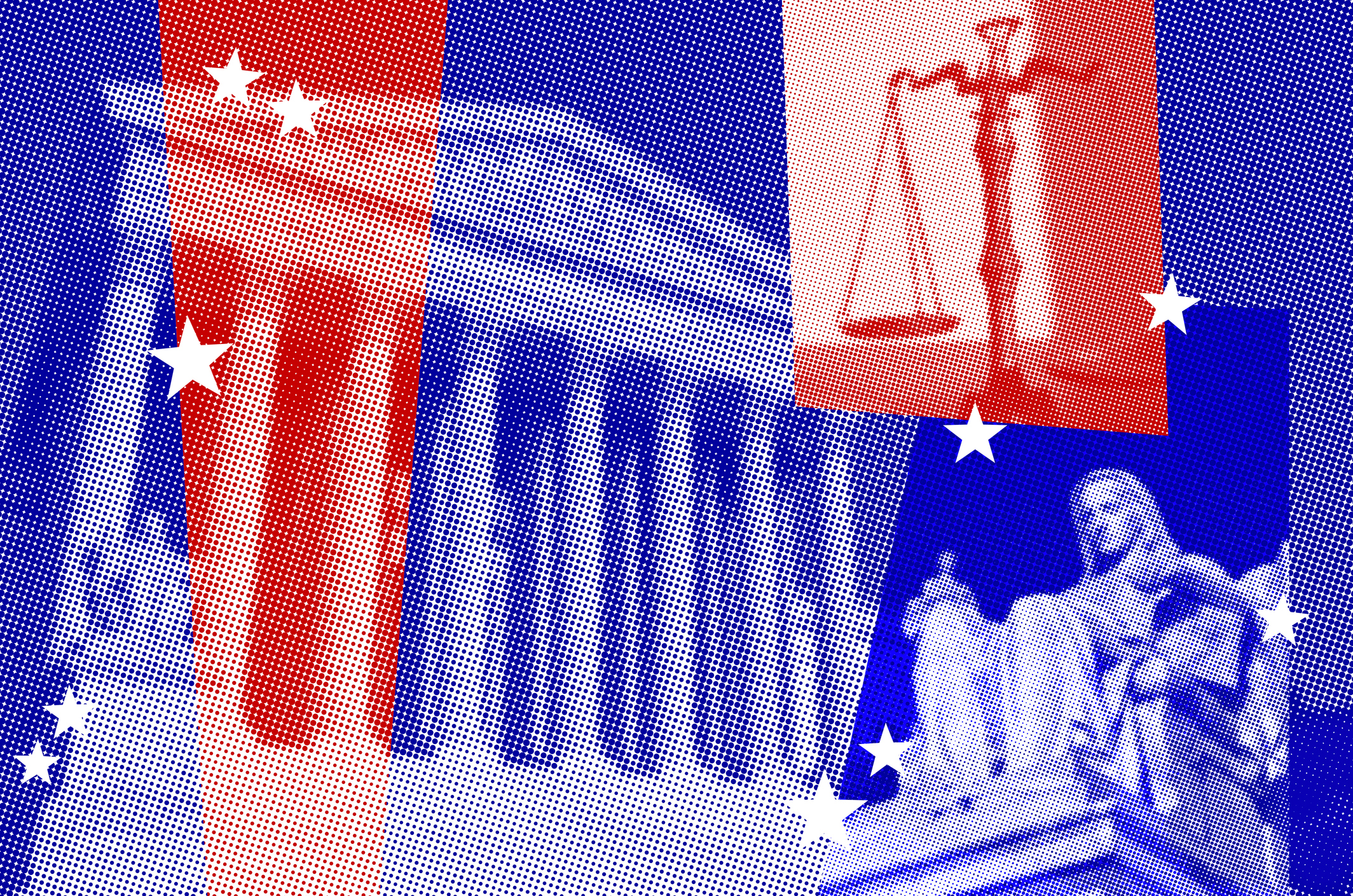The Supreme Court succumbs to a fatal error in reasoning.
Corrective Firing

Cancel culture and its roots in civil rights law.
At this point it is well documented that people lose their jobs for a range of deeds, real or alleged, that run afoul of today’s “woke” mentality. What is striking is that we do not already have a widely agreed-upon name for this phenomenon (though we do for its ugly twin, cancel culture). I would like to suggest “corrective firing.”
This aspect of contemporary life—the fact that people lose their jobs and are silenced, shamed, and otherwise punished in terms that affect their ability to earn a living for reasons that are ultimately political—is in a way well-known, but also somehow obscure. At any rate it is not immediately thought to be something achieved by our laws or by our civil rights laws in particular.
I propose the term “corrective firing” because it usefully indicates the origins of this phenomenon precisely in the law—in Title VII of the 1964 Civil Rights Act, governing employment discrimination, and in the express terms of EEOC guidance documents of the 1980s and 1990s (later sanctified by the federal courts) that came to modify and expand the vital substance of Title VII in significant ways.
Naming corrective firing is an important step for a number of reasons. First, it begins, in the word “corrective,” to emphasize the emphatically political nature of this phenomenon. Because the punitive actions taken in the employment domain are “private” (or, even where an employer is a governmental entity, employment decisions are somehow sub-official or informal), it is not immediately obvious that corrective firing is the product of our laws and the moral tsunami called the civil rights revolution that lies behind those laws. But it most certainly is.
Second, using the term helps to illuminate how civil rights politics has come to be characterized by an increasingly punitive mode and tone. We all sense that this is the case, but we do not see as well as we might its roots in the character of elementary civil rights enforcement. Usually, it is true, the punitive character of anti-discrimination politics is on display in the mob mentality of cancel culture and the cowardice of people in authority who bow to it. But, as we shall see, cancel culture itself was built upon the legal edifice of corrective firing.
Most important, acknowledging the political-legal origins of corrective firing puts us in a position to think more clearly about its legitimacy and advisability and, at a minimum, to consider the need for better safeguards for those affected by it. As it is now, accusations of discrimination work morally to silence all debate (not to say all thought). But, as an examination of the facts on the ground makes plain, that is a dangerous approach to meting out justice. The moral energy of the civil rights revolution, and its political power, must not be permitted to override every other consideration of fairness. Like freedom of speech, our liberal democratic tradition’s concern with “due process” is an important moral resource here and one we need to hang on to at all costs.
Corrections Officers
The legal basis for corrective firing is somewhat hidden in a convoluted tale of EEOC policies and federal court mandates. Certainly no statute explicitly says: “You shall be fired if you are found to be, or are plausibly accused of being, racist, sexist, homophobic, or otherwise unregenerate.” But law is the main foundation of this practice—and the practice would not exist without this legal basis.
The first steps in the legal story were the privatization of Title VII enforcement through liability mandates and the expansion of “discrimination” to include above all the idea of “hostile work environment harassment”—developments that were entirely the creations of the EEOC and the federal courts, not Congress (Congress did eventually note the idea, in passing, in the 1991 Civil Rights Act).
Once those were in place, employers looked nervously to the EEOC and the courts for some kind of legal “safe harbor.” When, in the 1990s, major sexual harassment lawsuits with settlements in the hundreds of millions of dollars started to make headlines, employers wanted some way to protect themselves.
During that decade, the EEOC and the courts obliged, setting forth a range of actions employers could take that would be viewed favorably if they were the subject of a lawsuit. Some of these were efforts to educate toward, and to publicize, the imperatives of the new order: setting clear policies, what became “diversity training,” establishing designated diversity offices and officers, etc.
But some of the measures fell under the heading of “disciplinary action against the offending supervisor or employee,” as one 1990 EEOC guidance document put it, disciplinary action “ranging from reprimand to discharge.”
Another 1999 EEOC guidance document spelled out at length what the corrective in “preventive and corrective measures” would mean: “Examples of Measures to Stop Harassment and Ensure that it Does Not Recur [include] oral or written warning or reprimand; transfer or reassignment; demotion; reduction of wages; suspension; discharge; training or counseling of harasser to ensure that s/he understands why his or her conduct violated the employer’s anti-harassment policy; and monitoring of harasser to ensure that harassment stops.”
Such measures are among those to which the Supreme Court quietly gave its blessing when, in 1998, it announced what is now called the Ellerth-Faragher Title VII liability test. In a pair of cases, the court told employers seeking to insulate themselves that they must demonstrate that they had “exercised reasonable care to prevent and correct promptly any…harassing behavior.” With the high court’s approval, the guidance of the EEOC became authoritative.
Employment attorneys then spread the word to their corporate clients. Self-interest (avoiding lawsuits with big dollar settlements) was combined with decency (obeying the law and escaping the moral opprobrium associated with harassment claims). What followed was the regime of corporate indoctrination and privatized law enforcement that we today call woke capitalism. And corrective firing is its most forceful element—one not merely “implied” by the law but insisted upon in express terms.
The range of activities for which individuals have been sanctioned under this framework is revealing. At one extreme are infamous cases of harassment—and in the case of sexual harassment on campus in particular, this extends to sexual assault as well (Title VII has provided much of the architecture of Title IX). But at the other extreme are people deemed innocent, or who suffer penalties merely for their beliefs. There is a small literature here, essays in Time, The Atlantic, and The Federalist, e.g.: “Stop Firing the Innocent,” “We Can’t Have ‘National Dialogues’ If People Get Fired for Talking Honestly,” “Can You Be Fired for Being a Racist?” “Is Being a White Supremacist Grounds for Firing?”
But in between, there is a wide range of activities punished under the new order. This area is in a way more interesting: offensive statements in the workplace; offensive statements outside the workplace (posted on social media or sent by private email but somehow discovered by others); actions or words interpreted to be offensive or discriminatory that were not intended to be (using an “OK” hand sign, e.g.); offensive behavior in the remote past (photos of offensive Halloween costumes, e.g.); forwarding or “retweeting” the offensive statements of others; statements structured in neutral terms (otherwise legal), like the language of modern science, that convey a message deemed nevertheless to be offensive (Harvard President Larry Summers and Google’s James Damore on gender disparities in science and tech); failing to report or to take action against the discriminatory actions done by others; lackluster efforts to uphold the cause of anti-discrimination (especially in universities or corporations caught up in some kind of discrimination controversy or lawsuit, and especially for those in leadership positions); expressing (perfectly legal) criticism of politically controversial phenomena relating to anti-discrimination politics (gay marriage laws, abortion, the Black Lives Matter movement); criticizing, or refusing to take part in, diversity training and the like; raising criticisms against the means by which an institution enforces its perceived anti-discrimination mandates; criticizing the alleged hypersensitivity to discrimination of others (students, co-workers).
In all of this, it is worth adding, actions (and inaction) count against the accused for as long as employers and other relevant parties may learn of them—which means of course that one instance of apparent discrimination can be not just a job-ending but a career-ending event.
The Shadow Regime
One looks in vain to the Left to be worried about all of this. That is in a way strange. When it comes to criminal law, of course, the progressive mind is deeply suspicious of the punitive impulse in general and hyper-vigilant in its commitment to the procedural rights of the accused. At the extreme edge of this impulse, the criminal law itself, and its enforcers, the police, are held under suspicion.
But when it comes to racism and sexism and other forms of discrimination, the progressive mindset is oddly loosened from these time-hallowed moral moorings. Now it is accusers who are to be believed, full stop. No more innocent until proven guilty. No procedural rights for the accused—to an attorney, to know the charges laid, to confront one’s accusers. And certainly no general suspicion of the law or its enforcers. If at the end of the day the accused is penalized with significant force (losing one’s job and/or career may very well amount to a greater penalty in fact than a criminal conviction) by some dubiously authoritative private party operating with no formal process, no transparency, and no legal or political oversight—well, that’s what justice demands.
Racism is a sin, some very famous people have said. What does it mean that we have created a legal system that treats accused racists (and sexists, etc.) more harshly and with less basic consideration than in some instances we treat the criminally accused?
Furthermore, such matters are veiled in secrecy (employee privacy rights; non-disclosure agreements) and both the employee and the employer have good (if very different) reasons to want to keep them quiet. Any person terminated in this way will find it difficult to object effectively (the law of “at-will employment,” another important step in the legal story) and, if he or she wants to find a job elsewhere without a tainted record, will have a major incentive to acquiesce even when feeling that the outcome is unfair.
In what we call cancel culture, the silencing of speech also takes a coercive form and is in a way part of or akin to corrective firing in its intent and effect. Cancellation, deplatforming, demonetization, and compelled speech (required diversity statements for job or school applicants and the like) all likewise have an effect on the targeted individual’s ability to earn a living or to receive an education. Because most of these more coercive or forceful forms of censorship are undertaken by non-governmental institutions or individuals, they are not generally subject to the free speech protections of the First Amendment.
But these things are not simply similar in their nature and effect. Cancel culture would not exist without corrective firing and the legal basis underpinning it. Indeed, the word “culture” in cancel culture (like the obscure character of the law) hides the phenomenon’s manifestly political origin. To be sure, cancel culture is partly a matter of imitation of the punitive character of civil rights law. When protesting college students insist that a controversial speaker be disinvited from a campus visit, they may imitate the harsh punitive character of the law’s “corrective” dimension, even though they will not likely invoke Title VII as their authority. But the academic administrator who gives in to their demands does not do so in a legal vacuum. And, when the same students in such cases call for the firing of the administrator they do indeed follow out, wittingly or unwittingly, the logic of Title VII and its corrective firing apparatus.
Cancel culture on the internet is tied to the law of corrective firing in an even more direct way. For all internet platforms are employers and already governed by Title VII. They have already been trained by the law of corrective firing and, just as important, in the fear of lawsuits corrective firing was devised to alleviate or ameliorate. Yes, it is true that woke employees, consumers, board members, and CEOs play a role in the willingness of internet companies to censor the politically incorrect. But we must not mistake cause and effect here. Wokeness is the product of the law, and corporate culture became a cause of wokeness only after it had been shaped by the law.
Here of course the issue is less due process than freedom of speech, another place where we are thrown back on our liberal democratic political heritage for recourse.
The phenomenon of corrective firing shows we need to think about reforming our civil rights laws. Corrective firing is the hidden fist of civil rights law. As a result it both gives great force to the whole and helps to characterize its general tone and character. But did we actually choose all that it entails with full knowledge of what we were doing? No, we did not.
Because the law’s role is so hidden from view, and its enforcement seems merely a matter of the “voluntary” actions of “private” parties, we barely even see that this is our state of affairs. How can we even begin to talk of reforming these powerful and life-shaping laws when we barely even know that they exist?
The American Mind presents a range of perspectives. Views are writers’ own and do not necessarily represent those of The Claremont Institute.
The American Mind is a publication of the Claremont Institute, a non-profit 501(c)(3) organization, dedicated to restoring the principles of the American Founding to their rightful, preeminent authority in our national life. Interested in supporting our work? Gifts to the Claremont Institute are tax-deductible.
Are we ready to face what colorblindness would really look like?
Curbing censorship will require a full-scale assault on the surveillance state.



